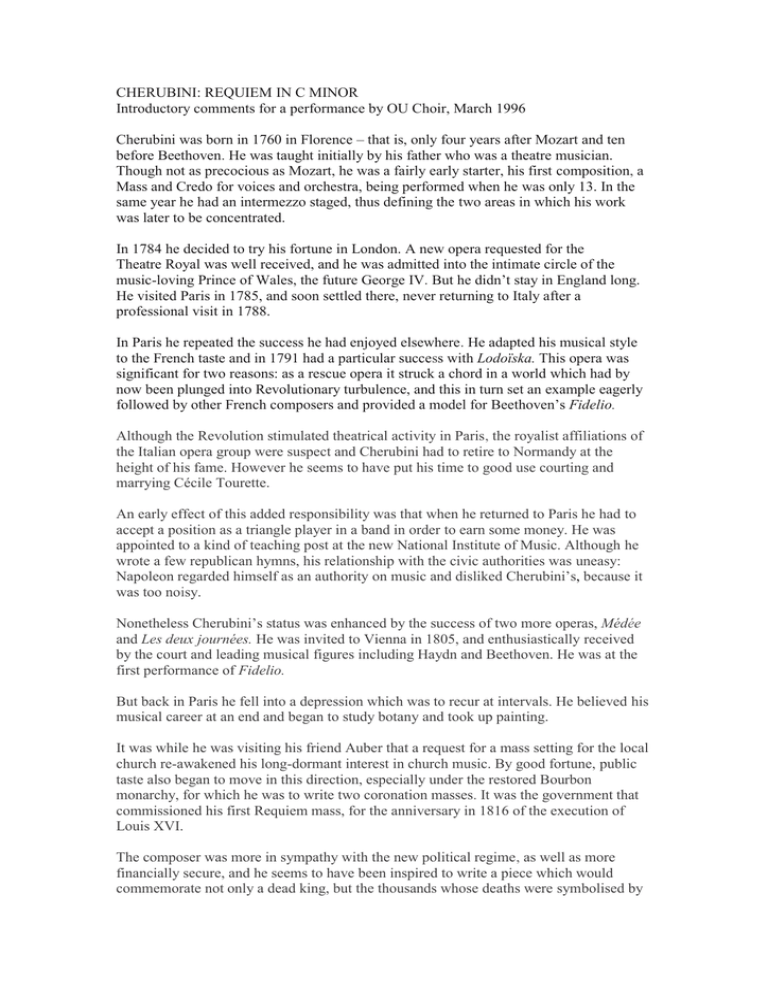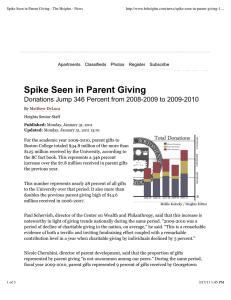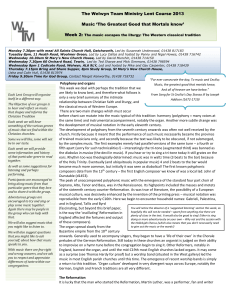View 1996 introductory talk
advertisement

CHERUBINI: REQUIEM IN C MINOR Introductory comments for a performance by OU Choir, March 1996 Cherubini was born in 1760 in Florence – that is, only four years after Mozart and ten before Beethoven. He was taught initially by his father who was a theatre musician. Though not as precocious as Mozart, he was a fairly early starter, his first composition, a Mass and Credo for voices and orchestra, being performed when he was only 13. In the same year he had an intermezzo staged, thus defining the two areas in which his work was later to be concentrated. In 1784 he decided to try his fortune in London. A new opera requested for the Theatre Royal was well received, and he was admitted into the intimate circle of the music-loving Prince of Wales, the future George IV. But he didn’t stay in England long. He visited Paris in 1785, and soon settled there, never returning to Italy after a professional visit in 1788. In Paris he repeated the success he had enjoyed elsewhere. He adapted his musical style to the French taste and in 1791 had a particular success with Lodoïska. This opera was significant for two reasons: as a rescue opera it struck a chord in a world which had by now been plunged into Revolutionary turbulence, and this in turn set an example eagerly followed by other French composers and provided a model for Beethoven’s Fidelio. Although the Revolution stimulated theatrical activity in Paris, the royalist affiliations of the Italian opera group were suspect and Cherubini had to retire to Normandy at the height of his fame. However he seems to have put his time to good use courting and marrying Cécile Tourette. An early effect of this added responsibility was that when he returned to Paris he had to accept a position as a triangle player in a band in order to earn some money. He was appointed to a kind of teaching post at the new National Institute of Music. Although he wrote a few republican hymns, his relationship with the civic authorities was uneasy: Napoleon regarded himself as an authority on music and disliked Cherubini’s, because it was too noisy. Nonetheless Cherubini’s status was enhanced by the success of two more operas, Médée and Les deux journées. He was invited to Vienna in 1805, and enthusiastically received by the court and leading musical figures including Haydn and Beethoven. He was at the first performance of Fidelio. But back in Paris he fell into a depression which was to recur at intervals. He believed his musical career at an end and began to study botany and took up painting. It was while he was visiting his friend Auber that a request for a mass setting for the local church re-awakened his long-dormant interest in church music. By good fortune, public taste also began to move in this direction, especially under the restored Bourbon monarchy, for which he was to write two coronation masses. It was the government that commissioned his first Requiem mass, for the anniversary in 1816 of the execution of Louis XVI. The composer was more in sympathy with the new political regime, as well as more financially secure, and he seems to have been inspired to write a piece which would commemorate not only a dead king, but the thousands whose deaths were symbolised by that of Louis – in other words, to attempt a setting which would be universally applicable. In order that no detail should distract from the overall unity of his conception, he eliminated soloists entirely and strove for continuous, cohesive forms, distilling his musical idiom, avoiding embellishment of the melodic lines and relating his chromaticism and modulation strictly to the textual meaning. The piece achieved immediate and lasting success. Beethoven said that if he should write a Requiem, Cherubini’s would be his only model – and indeed this is the Requiem that was played at Beethoven’s funeral. Schumann called it unequalled, Brahms said it was marvellous. It is a work of considerable dignity. It prefigures the Fauré’s more familiar Requiem in laying a certain stress on the peaceful aspects of the text, extending the opening mood by the inclusion of the Gradual, No 2, of which I know no other setting. In these opening movements the violins are omitted, while violas and sometimes cellos are divided, to create a mellow texture. This changes with the Dies irae, the long, dramatic poem being set without a break, which makes it a rather long movement. Some details of the louder and longer movements may remind you of Verdi’s Requiem, but that too was some 60 years in the future. The Offertorium has quite a short text, but is conceived as an even larger unified movement, albeit in two halves which offer some contrast of mood – and the Hostias features a most fabulous tune. Conversely the Sanctus is very short: this is in the French tradition. But Cherubini also uses it to set up the quiet movements that follow. First the Pie Jesu – not set by Mozart or Verdi, but famously by Fauré. Then ‘the Agnus Dei in decrescendo’ that Berlioz said ‘surpasses everything that has been written of the kind’. This was high praise indeed, because Berlioz hardly had another good word for Cherubini. The trouble seems to have started when Cherubini, as Director of the reconstituted Conservatoire, threw Berlioz out of the library. The younger man recounts the incident in his Memoirs, mercilessly lampooning Cherubini’s broken accent. ‘Eh! eh! So it is you, it is you who have come een by the door that I weell not ’ave you use?’ (He had decreed that men and women must use doors at opposite ends of the building.) As the years went by it was this rather dry, authoritarian aspect of Cherubini that tended to be remembered. He took his responsibilities as a teacher very seriously and produced instructional works that were widely used but seem eventually to have eclipsed and prejudiced his reputation as a composer. However, in our own century Toscanini and Ricardo Muti have been champions of his choral music, and even as we have been preparing this performance another new recording has come on to the market. So perhaps he is due for a revival, and if the pleasure the choir has had preparing this concert is anything to go by, the old boy certainly deserves a bit more attention.





